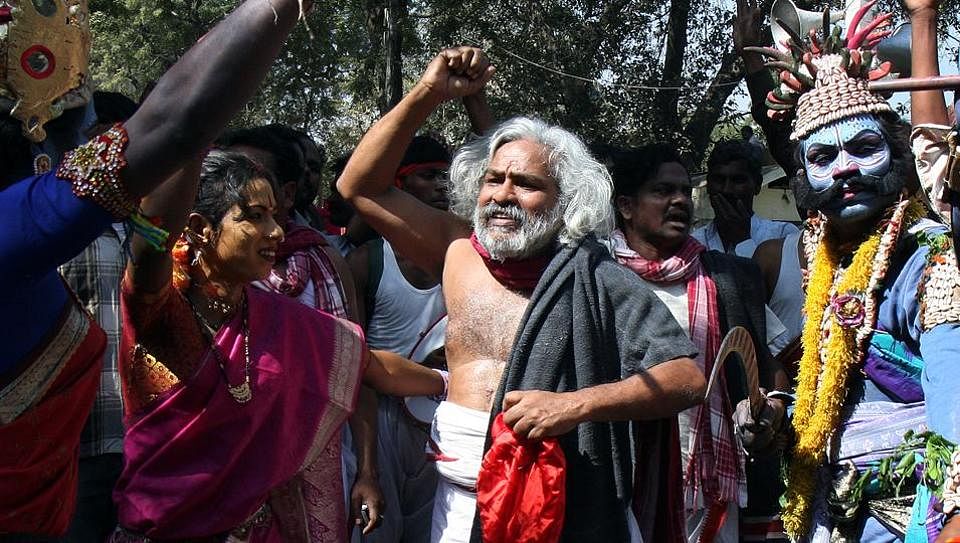
Credit: Special Arrangement.
Celebrated Telangana balladeer Gaddar died on Sunday, August 6 at a hospital in Hyderabad. He was 77 and is survived by his wife, Vimala, a son and a daughter.
Often referred to in Telugu as ‘Praja Yuddha Nouka’ (Warship of People’s Agitations), Gaddar had survived a murder attempt in the 1990s. He lived with a bullet stuck in his spinal cord till the end.
Born as Gummadi Vittal Rao in a Dalit family in Medak district, Telangana, he adopted the stage name of ‘Gaddar’ as a tribute to the Ghadar Party, which fought against British colonial rule in Punjab. His father, who had met Babasaheb Ambedkar, encouraged him to study.
Young Gaddar went to Hyderabad and joined an engineering college. He was soon radicalised by the Naxalbari movement and the Dalit Panthers. He spent most of his youth underground, working for the People’s War Group in the 1980s. During his underground life in the forests, he continued working as a cultural activist and visited Chhattisgarh and Odisha.
In later years, Gaddar returned to the mainstream and was actively involved in the socio-cultural politics of the state. By founding the cultural organisation Jana Natya Mandali, he became an icon of resistance. He performed widely, going shirtless, and sporting a white dhoti and black and red shawl. He appeared on stage holding a wooden staff and wearing anklets on his feet. He had switched to trousers and shirts only in recent years.
In school, I was fortunate to be classmates with his second son, Chandra Kiran, who sang his father’s songs for us. He kept in touch with me, as his ‘rakhi sister’, after we left school for higher education. However, fate took him away too soon in 2003, when he was about 23.
In human rights activist Haragopal’s words, Gaddar cannot be described in a sentence. He was a symbol of revolution. He reflected the people’s aspirations through his songs. He became a prominent voice in the Telangana statehood movement. His song ‘Podustunna poddu meeda’ became the anthem of the movement. It was later included in the movie ‘Jai Bolo Telangana’ (2011, directed by N Shankar). Gaddar plays an important role in this Jagapathi Babu- Smriti Irani film.
Gaddar’s tryst with Telangana cinema began with a song for producer-director B Narsing Rao in ‘Maa Bhoomi’ (1979, directed by Gautham Ghose). He gave voice to the most popular song of the Telangana peasant rebellion, ‘Bandenaka bandi katti’ written by Bandi Yadagiri. The film won critical acclaim and awards and remains one of the classics of Telangana cinema, a genre shaping up with more vigour after the state was formed.
‘Badhram koduko naa koduko’ is another landmark song from ‘Rangula Kala’ (1983, directed by B Narsing Rao). The movie was awarded the best feature film in Telugu for its portrayal of urban life through the eyes of a painter who tries to connect with the masses. Gaddar not only performed it but also composed music for the film.
By the 1990s, Telugu cinema saw a genre of ‘red films’ that dealt with unemployment, land ownership, crony capitalism and migrant labour. R Narayana Murthy emerged as the star of this genre with films such as ‘Laal Salaam’(1991), ‘Dandora’ (1992), ‘Erra Sainyam’ (1993), and ‘Orey Rickshaw’ (1995). These were directly inspired by the Communist movement, and also the movement for a separate Telangana state.
The song ‘Raktham tho naduputhanu rikshanu….’ in ‘Orey Rickshaw’ brought immense fame to Murthy as a hero of the masses, and he often emulated and exaggerated Gaddar’s gestures. Another emotional song, ‘Nee paadam meedha puttu’, was a huge hit. It conveys the pain of a man who loses his sister to injustice, and was penned by the balladeer himself with music by Vandemataram Srinivas.
Similarly, ‘Dandakaranyam’ (2016) foregrounds the rights of tribals. Gaddar played a lead role in this film directed by Murthy. It depicts the exploitation of tribals in the forest areas for bauxite mining. Gaddar played a small role in his last film, megastar Chiranjeevi’s political action-thriller ‘Godfather’ (2022).
From urging people not to vote to coming up with his own Gaddar Praja Party, Gaddar had travelled a long way. His roar has fallen silent, but his songs will continue to inspire those seeking social justice, equality and empowerment.
(The author is assistant professor, College of Fine Arts, JNAFAU, Hyderabad)